“I felt the power of Athos,” says Archbishop Theophylact of Pyatigorsk and Cherkessk, returning not long ago from a pilgrimage to the Holy Mountain along with fifteen priests of his diocese.
“Power—this word seems to have a negative meaning, but the power of Mt. Athos is Love, which does not coerce but inspires and fills the lungs with air.”
—How many times have you been to the Holy Mountain? This wasn’t your first trip, correct?
—It was not my first. I try to go to Athos twice a year, usually during the fasts. I’ve had this thirst for some time, to go to Mt. Athos during the fast—a thirst and a need.
I will speak completely openly and sincerely: there was a time when I internally, if not resisted, in any case didn’t understand this desire for Mt. Athos. “You have to go to Athos! Have you been to Athos?” If you say you haven’t then you hear “How can that be? You haven’t been to Mt. Athos?!” All this didn’t make me want to go there—quite the contrary.
I was really quite tranquil about the fact that I hadn’t been there. But suddenly one of my friends, a secular man, said to me, “Vladyka, some friends and I would like to go to Holy Mount Athos. Maybe we could go together? If you go, we would feel safe with you.” And so, it’s funny to say, I first went to Athos as a guarantor of peace for my friends.
And I had a very deep and personal meeting with this place, which the residents call “the Garden of the Mother of God.” It ended with me telling my friends when the end of our trip arrived: “You can manage the road home without me. I will stay here.” And I stayed another few days.
And since that time, for me to go to Athos is, as you know, to be myself. It’s not about trying to forget everything, or to escape something, but to be in that environment where you become like a fish in water, in your natural environment.
—Nonetheless, this last trip was quite unusual.
—Yes, and that’s because I went with my priests this time.
Athos is a place that wants to be shared. It’s not a personal discovery; it’s not even some personal experience. It is that very joy which wants to be shared, because when you share it, it becomes deeper within you, and penetrates all the deeper within you.
So this year, there was a good reason—the millennium of the Russian presence on Mt. Athos—I appealed to His Holiness Patriarch Kirill and asked his blessing to travel with my clergy.
This thought was born, if I can say, spontaneously: we had an extended meeting at our diocesan council, discussing the life of our diocese, and we spoke about various projects and about the celebration of the millennium of the Russian presence on Mt. Athos. And I joyfully said: “Come on, let’s all go together.” Of course, to celebrate an Athonite celebration you have to go there at least once. It turned out that only two of the priests there had been to Athos. And we were a big group of seventeen people traveling to the Holy Mountain. Of course, there were difficulties associated with this: it’s hard when you have a big group to solve organizational issues, but this isn’t the most important thing. Most important is that, for the sake of our group, I asked our friends on the Holy Mountain to give us the chance to visit as many monasteries as possible.
And it worked out for us—in a week we visited a number of monasteries and cells, were able to talk with the abbots of the monasteries, and participated in the services. Every day we all communed, and we were all able to serve Liturgy, which, of course, was probably the biggest miracle and gift for my priests.
I was personally very deeply inspired when I spoke with the Athonite brethren; they give hope. To see a man living the spiritual life despite any external circumstances, to be in podvigs, though he himself does not notice…
Comparing my own life with that of the inhabitants of the cells or monasteries, even with the life of the abbots, and seeing how the people pray, labor, how they relate to one another—that is, understanding that for them this is their daily life, I felt some surprise, because in this life in which I now find myself, I can’t always meet such people. I’m speaking now not about someone else, but unfortunately about myself. Because of our routine of endless affairs, that which always remains in the center on Athos often ends up on our periphery.
There at the center is Christ. And everything is done for His sake, in His name, for Him. Of course there are difficulties in human relationships there, but Christ is the center all the same. The center is worship.
At the ringing of the bell or knocking everyone goes to the services—it’s a call for each and every one. It’s like on a ship. And you really feel that Athos is a ship of salvation: the whole team is assembled, and no one is left outside the common cause, and the common cause unites. It’s very inspiring.
—We have a piece of Mt. Athos in Moscow—the St. Panteleimon’s Monastery podvoriye, where once a week they serve a true all-night vigil, starting at 10:30 at night and finishing around 7:00 in the morning.
I want to ask you: what can you take with you from Mt. Athos to bring to your flock?
—We already brought it. The monastery where I live is called Second Athos, because it was founded by monks from the Holy Mountain.
—Forgive me for interrupting you, but you live in a monastery?
—Yes, in the Dormition Second Athos Monastery on Mt. Beshtau. After I began to get more closely acquainted with Athos, I suggested to the spiritual council to discuss the possibility of returning to the traditions of liturgical services connected with the Athonite order. Glory to God, we were able to return to these traditions, and it turns out, there is enough time for everything. It just needs to be properly distributed.
Let me rephrase. Everything on Athos is built around unity in Christ, and the highest expression of this unity is, of course, common prayer. Prayer is not an oppressive obedience, not a hopeless part of Tradition (“Well, if we must, we must”). Prayer is what people go there for, why they gather there. All the rest becomes secondary. Administrative tasks and the endless hassles, and so on, become secondary. The main obedience is the obedience of prayer.
Fr. Alexei, the abbot of Xenophontos Monastery, visited us not along ago in the Caucausus; he was in our monastery, and spoke with the brothers and sisters of the convent of our diocese. He spoke to us about how to arrange life. It’s very simple. There are twenty-four hours in a day: six hours for rest, six hours for work, six hours for common prayer, and six hours for mental prayer and your own education. This is the time you should pray in your cell, read a good book, or contemplate God. If you follow this order there will be time enough for everything, and so on, from day to day.
And this is wholeness. And I must say that after a week of being on Mt. Athos you enter into this rhythm—the natural rhythm of this division into sleep, work, prayer, and contemplation of God. And everything falls into place, and there is time for everything.
—And what, Vladyka, about this trip made such a strong impression on you?
—Interest—the very deep interest the Athonites, the inhabitants of Holy Mount Athos—show in other people. It is manifested in that they immediately begin to talk about Christ. There they don’t ask: “How’s it going?” or “How do you feel?” or “How was your trip?” “What’s new?” There there are no “requirements,” or, more precisely, idle talk. There they immediately begin to speak of spiritual things, about God.
Of course, it is truly the most important thing to which you must constantly testify, being a priest. Here I’m flying on a plane, in a cassock, and it’s understandable that I will immediately begin talking with someone about God, about faith, and no one will be surprised. Everyone will say: generally, that’s how it should be—he serves God—what else should he talk about? But to my great shame I find that it doesn’t always work out this way. Especially with familiar people, words about God, about Christ are not always the central part of our conversation.
Not so with the monks of the Holy Mountain. They always speak of one and the same thing: about Him. Immediately. “Hello, I’m very glad to see you. How’s your prayer life? We have services later. Now you can drink some tea and then we’ll go to the service,” and of course, it is most impressive.
—One of my favorite books is Athonite Fathers, Athonite Matters by St. Paisios the Athonite, where he describes those ascetics he either personally met or heard about from those who closely knew them. Are there such people on Athos now?
—Yes, and thank God, you can meet them. I remember Fr. Alexios: he has labored on Mt. Athos for more than forty years; he is the abbot of a monastery. Of course, he can speak about what was done there for the monastery, but the truest joy is seen in his eyes when you start asking about the spiritual life: about how often the brotherhood of the monastery communes, how often they confess. When you ask about such things you see that the fathers’ eyes simply light up and they begin with greater inner inspiration to speak about what is most dear to them.
I asked about participation in the Eucharist for people not married in the Church—it is common for us in the Caucausus that the husband, for example, is Orthodox but the wife not, and vice versa. How can such a person participate in the Mystery of the Eucharist if his marriage is not crowned in the Church, and cannot be crowned because his wife is of a different religious tradition?
And on Athos, by the way, it is one of the first questions they ask pilgrims—was your marriage in the Church? If not, then you are not admitted to Holy Communion. It puts some in a difficult position at first, and then becomes a motivation, upon returning home, to ponder your marriage—I know some people who came to be crowned in Church precisely after visiting the Holy Mountain. Answering such questions, Fr. Alexios begins talking with such an open heart, with such a thirst to speak about how the most important thing in life is unity in Christ, in our standing before God, and in truth and the purity of our own life…
He spoke about many interesting things, with a great many examples from the lives of Athonites he knows, from his own life, from the lives of the saints, and you understand by what a man lives. I can say he’s a true living elder.
Some think that eldership consists in someone peeling back the mystery of your future. For me, the most important miracle is to open the mystery of your present, which you’re trying not to notice. The present often remains concealed. We are often completely careless about life, everyone thinking of some kind of future, and, strictly speaking, negligence in the present day is the most terrible mystery of all lawlessness.
Together with my clergy I met the abbots of different monasteries, with elders, “gerondas” as they are called, and they all speak not about what awaits Russia or the Russian Church and mankind, but about what is happening with you now: how you pray, how you serve.
One father asked: “How do you prepare for Liturgy? What does preparation for Liturgy mean for you? How often do you serve? How do you gather your community?” Such questions were completely unexpected, but quite necessary, because precisely what is happening right now is what’s necessary for your own salvation—now, not somewhere in the future.
—And they themselves ask such questions and are really so deeply interested?
—Yes. To them it’s not a trifle. One elder asked me: “Why did you come this time?” I answered: “I brought many priests here,” and he began to smile, and hugged me. My eyes even welled up with tears.
When a man opens up, the elder immediately begins to ask counter questions, to clarify. Batiushka says to him: “I prepare for the services by doing so-and-so, and I serve this often.” And the elder immediately asks: “How many children do you have? How much time do you spend at home?” He gave many of my priests such advice: “Be at home with your matushka and children more often and longer. A priest above all should take care of his own home church. Your loved ones are your strength, your inspiration and Divine blessing. And therefore arrange your day that enough time remains for your family.” It was useful advice.
—What kind of impression did this trip leave on your clergy?
—Maybe the most necessary of impressions. When we went there, they talked amongst themselves, discussed various things, and asked, “What’s happening with you at your parish?” And on the way back I saw them praying with their prayer ropes, and silence.

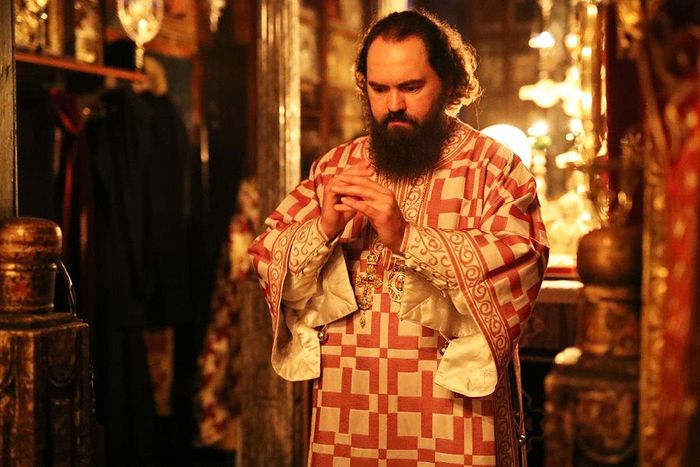
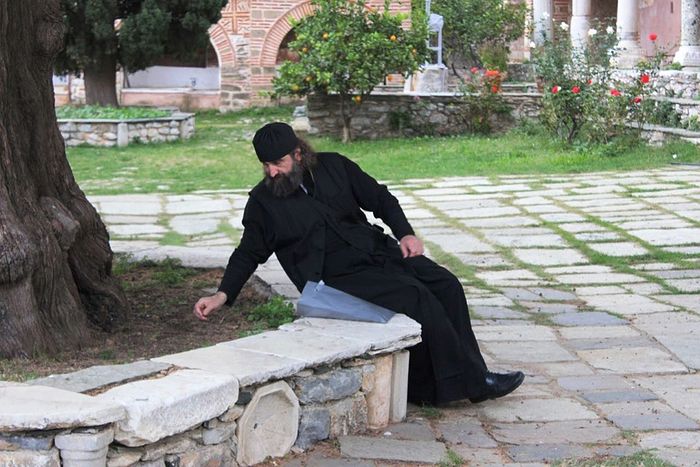
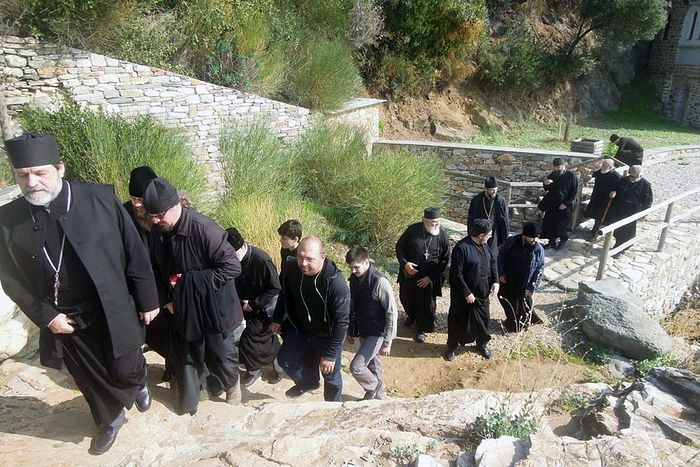
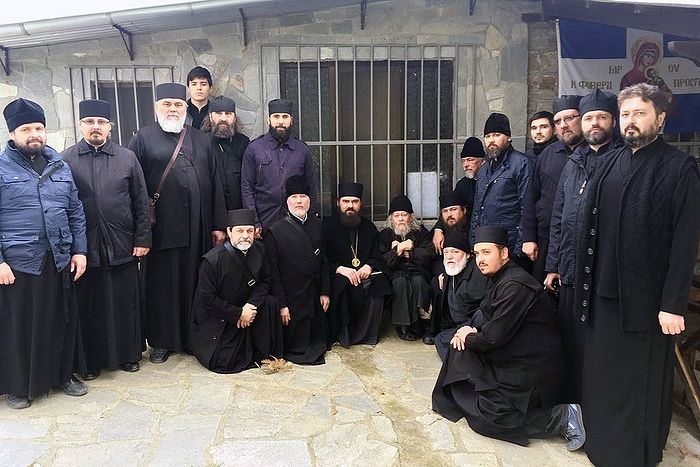
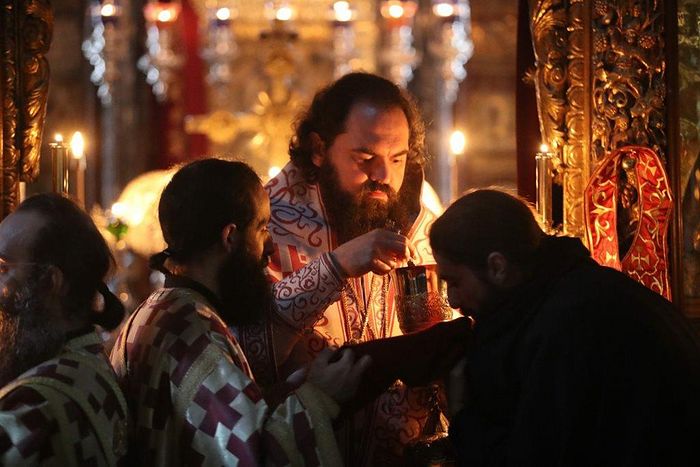
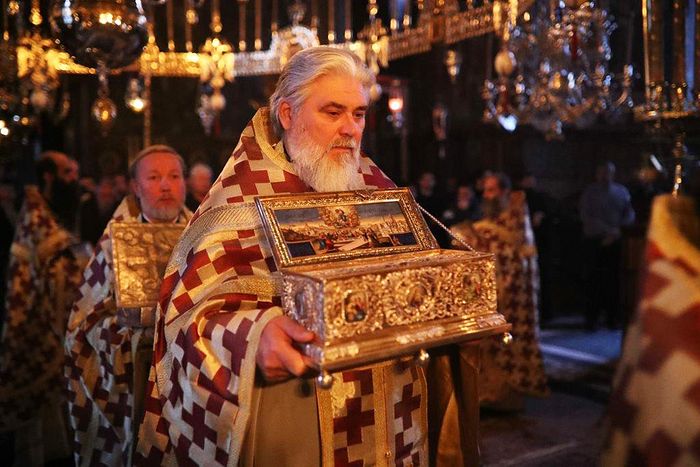
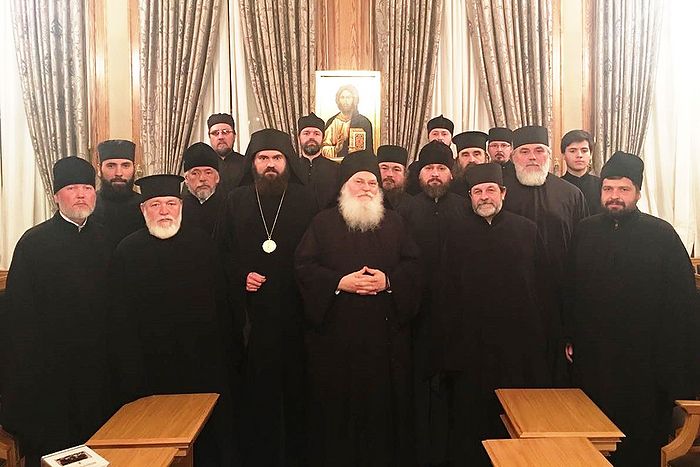
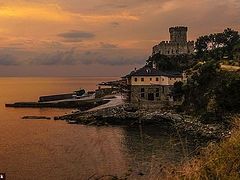
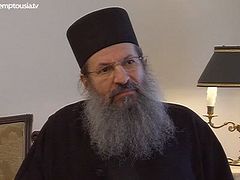
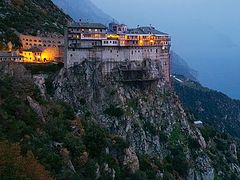
I am so glad to read about your journey to Mt. Athos. Thanks to Anastasia for the interview and Jesse for the translation. Very inspiring, especially regarding the temptations not to go to the Holy Mountain as a result of others who (no doubt well intentioned) keep insisting that we must go.
I wanted to let you know that your pilgrimage has already born fruit.
My family and I have spent our summer this year in a few different parishes in your diocese in the beautiful Caucus Mountains and our interaction with the clergy has been amazing. The loving kindness and attention to spiritual life has been the most noticeable thing.
Sometimes when you are visiting an unknown parish, the first response is from the parishioners themselves. Our experince with the parishes in Zelechukskaya and Nizhny Arkhiz has been pleasant, but it is the connection with the priests what has been the most surprising. Not only their visibly loving attitude towards their parishioners, but their interest and openness to us - passing strangers.
The original purpose of our vacation was to visit the mountains, but now we feel we have a real spiritual connection with these churches and this amazing place where Christian roots of the ancient Alani people can be felt in the soil and among those who now live in the same hills and valleys. We feel the love you are speaking about and we are ready to spend all our summers here.
God bless your inspiration!
Foma